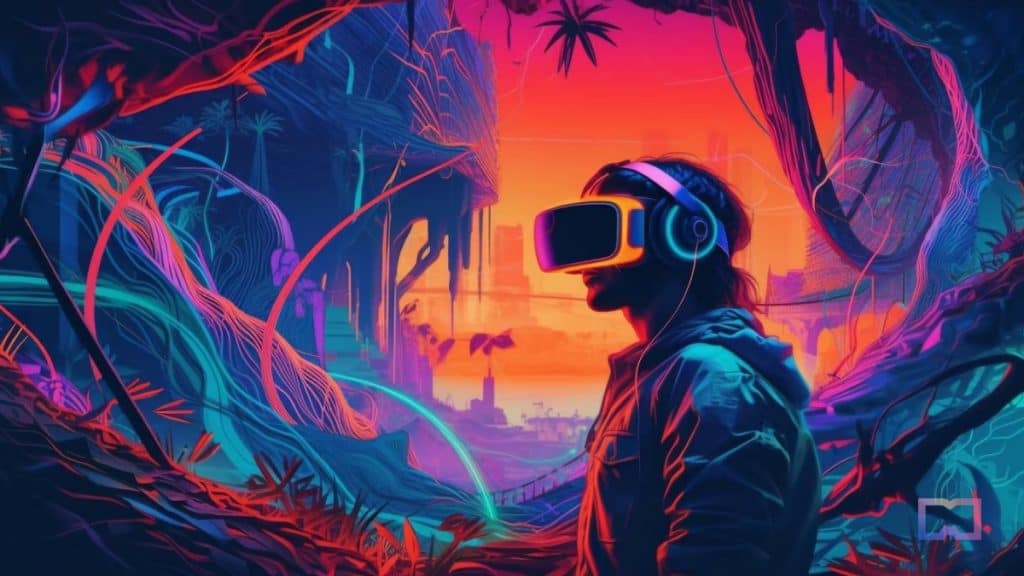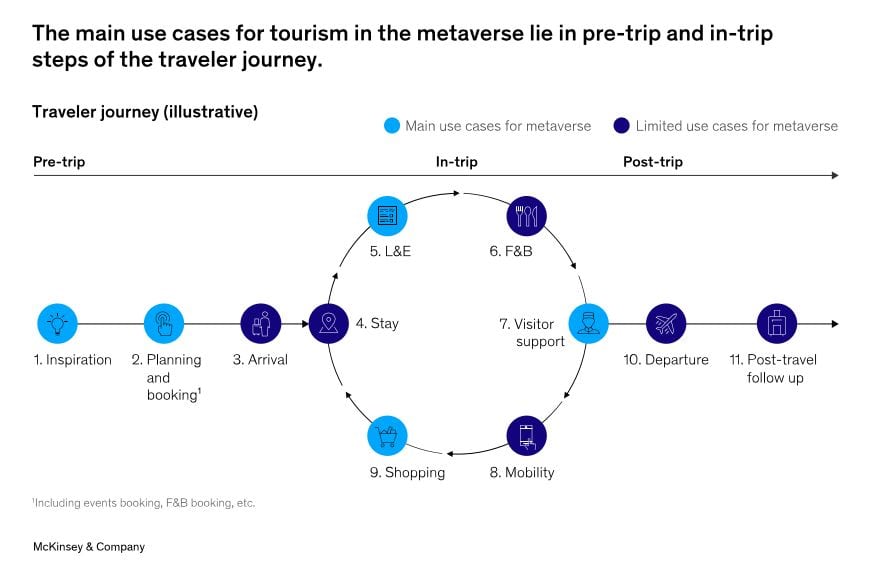A New Study Uncovers a Potential $20 Billion Opportunity for the Travel Sector in the Metaverse
In Brief
According to McKinsey, the travel sector could potentially tap into over $20 billion from metaverse innovations by the year 2030.
In tourism, the metaverse can significantly impact areas like leisure and entertainment, travel planning, visitor assistance, online shopping, and reservation systems.
Innovative players in the travel industry can utilize virtual event spaces and recreate famous landmarks, positioning themselves as leaders in navigating the evolving landscape of the metaverse.

The metaverse, powered by VR and AR tech, has immense potential to transform our travel experiences. McKinsey’s findings indicate that the travel industry could experience significant benefits from the engaging opportunities the metaverse presents. more than $20 billion by 2030 “Imagine a scenario where your travel options know no borders. Picture attending a concert in the front row alongside friends who are halfway around the planet, all of it taking place at the iconic Great Pyramid of Giza, with a massive audience of 300 million. Afterward, you could shop at a virtual bazaar and embark on a digital cruise along the Nile before instantly teleporting back home,”
envisioned by McKinsey for future travel powered by the metaverse.
Initial developments in metaverse technology have highlighted its potential to redefine exploration. For example, the French company Histovery employed augmented reality for an engaging exhibit that details the history of Notre Dame de Paris. Meanwhile, MGM Resorts International harnessed virtual reality to elevate staff training and onboarding experiences. Platforms like ZEPETO World and the BCB Group’s metaverse city provide virtual trips to global sites, merging education with entertainment and retail. Additionally, Saudi Arabia’s Royal Commission for AlUla has integrated the historical city of Hegra into the metaverse, giving digital tourists the chance to immerse themselves in its rich heritage.
The findings of the report emphasize that the primary applications of the metaverse in tourism revolve around leisure activities, entertainment, inspiration and travel planning, visitor support, as well as shopping and making reservations. This presents significant opportunities for enhancing the travel experience through innovative metaverse features.
Strategic Approaches for the Travel Sector in the Metaverse
McKinsey argues that proactive players in the tourism field can establish themselves as leaders in this transformative era. Early adopters of metaverse technology have mainly focused their strategies on two fronts: creating virtual event hubs and replicating notable landmarks.

Virtual event hubs have shown a promising capacity to attract both business events and entertainment attractions, generating revenue through ticket sales and attendance fees. Alternatively, extended reality (XR) landmarks provide visitors with immersive environments to explore, socialize, shop, and learn, while also shining a light on hidden gem destinations.
By overcoming obstacles such as interoperability, data security, and device accessibility, travel enterprises can design enticing traveler journeys and collaborate with metaverse platforms, retail channels, and creative designers. McKinsey suggests that by becoming early adopters of the metaverse, travel companies can forge valuable partnerships and conduct trials, better positioning themselves for future success in travel.
conducted a survey involving over 24,000 travelers across 32 countries, revealing that 43% plan to utilize VR for travel inspiration this year. Countries like China (75%), Thailand (72%), and India (70%) are leading in the adoption of VR technologies. Furthermore, virtual reality experiences can significantly affect travel destination preferences, with 46% of participants expressing an increased willingness to visit places they previously overlooked after experiencing them in VR. Even though 35% of respondents showed interest in multi-day VR travels, 60% still find conventional travel more satisfying.
In January, Booking.com’s research Booking.com Envisions the Future of Travel and Predicts NFTs Will Make a Splash in the Business World by 2026
Read more:
- The Influence of Artificial Intelligence on the Travel Sector
- In what ways is the metaverse expected to transform travel experiences this year?
- Please be aware that the content on this page is not meant to serve as legal, tax, investment, financial, or any type of advice. It’s essential only to invest what you can afford to lose and seek independent financial guidance if you have any uncertainties. For more details, we recommend checking the terms and conditions as well as the help and support sections offered by the provider or advertiser. MetaversePost strives for accurate and impartial reporting, but please note that market conditions may shift without notice.
Disclaimer
In line with the Trust Project guidelines Agne, a journalist, covers the latest trends and developments within the realms of the metaverse, AI, and Web3 for the Metaverse Post. Her enthusiasm for storytelling has led her to engage in numerous interviews with industry experts, always looking to reveal captivating narratives. Agne possesses a Bachelor's degree in literature and has a broad background in writing about a variety of subjects, including travel, art, and culture. She has also volunteered as an editor for an animal rights organization, where she helped raise awareness about issues related to animal welfare. You can reach out to her at







